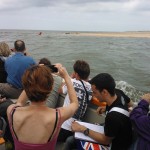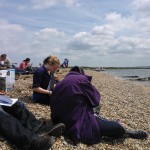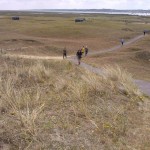This blog was contributed by Mark Simpson who is in the second year of a four-year BSc Environmental Science at Birkbeck.
I had known for some years that I wanted to “get a degree” but work, family, life and cost all conspired to get in the way of my further formal education. When Student Finance started offering funding (student loans) for part-time programmes back in 2010, I started to really think about which area of study would really engage me and keep me motivated. The key being “me”. Whatever I decided to do, it had to be for me. So I started reading.
In the introduction to his brilliant book A Short History of Nearly Everything (Penguin Random House), Bill Bryson comments that he “didn’t know the first thing about the only planet I was ever going to live on.” I then knew, deep in my head and heart, what I wanted to study. I was born and brought up in Asia and grew up in a multicultural world where monsoons, typhoons, seas, oceans, islands, highlands and a host of exotic plants and animals were part of my life. Professionally, I have been privileged to travel and work all over the planet – South America, Middle East, East and West Africa, Europe – and while I know something of the wonderful people, cultures and languages that inhabit our world – my knowledge of the physical planet on which I lived didn’t go far beyond my GCSE “O” level Geography.
Armed with this clear insight, I surfed the internet looking for a part-time Physical Geography undergraduate programme and while I couldn’t find exactly what I wanted, I did come across Birkbeck and an invitation to book into one of its open evenings. So on the day, I rocked up to the Geography, Environment and Development Studies (GEDS) desk and promptly described what I was looking for to a very patient lecturer, who in turn introduced me to something called “Environmental Science” – a four-year programme with modules from two different departments – GEDS and Earth Sciences. My search was over: I had the world in my hands.
That was two years ago…Second year exams are coming up and I am revising Environmental Processes, Structural Geology and Geophysics. At a time when the world is talking about global warming, climate change and IPCC reports, I am deep into the core subjects that make this planet the most amazing, ever-changing home we all share. I have discovered the joy of learning new things from some brilliant lecturers – people who have changed the way I think and indeed the way I view things.
Field trips
A significant part of my experience has been getting into the field…seeing, touching
(and on occasions tasting) the very environment I am learning about.
A trip to Kings Lynn – Hunstanton Cliffs was a great balance of applying knowledge gained from “reading” and learning how to “do things” in the field (from measurements to data collection) and talking things over with fellow students – without exception, every one of us want our degree to change our lives, but feeling the collective passion for the subject matter was a new experience for me.
Timing was important too – and not just for the weather – we had consumed two plus terms of learning before we hit the field, so some “knowledge” was already there; it all came together. Using the weekend meant no loss of earnings (for me), and I only wished we had come out on the Friday afternoon!
The day field trip organised by Isobel Tomlinson also helped to inform students after knowledge had been delivered, so things connected again. The same applies to the one day Geology event at the Jurassic Coast – we saw a little of what we had been hearing/reading about.
All of the above are examples of a good learning experience in the field.
Has it been hard? Have I had to make changes to lifestyle and other commitments? In short, yes. But what I have gained and what I stand to learn over the next two years have far out compensated anything I have had to forego. This is a personal journey and has been very fulfilling so far – and on the plus side, I did not start this degree for any career reasons, but it will certainly give me options for the future.
. 1 comment . Category: Higher education, Social Science History and Philosophy . Tags: career, environment, field trips, mature students, part-time




